新概念2 第14课课件
新概念第二册Lesson14课件

• respond vi. • 1) 回答,应答 • 她没有回答我的问题。 • She didn't respond to my question. • 她没有给我回信。 • She didn't respond to my letter. • 2) 对…做出回答或反应 • • He responded to the insult with a punch. • 他对侮辱的反应是重重的一拳。
Lesson 14
Do you speak English?
1
Discussion
1 Have you ever tried to talk to someone who didn’t know your language? What happened?
2 Describe the various ways you are able to recognize a foreigner in your country.
13
• on 有继续地,不停顿地 • Go on please. • 请继续。 • Walk on. • 继续走。 • on the way • 在路上 • in the way • 拦路或用这种方式 • on the way to • 在去某地的路上 • by the way • 顺便说,顺便提 • in a way or: in some way • 在某种意义上
hitch [hitʃ] a lift
搭车
19
• answer • 1) vt. (用语言,行为的)回答,答复 • 你回复她的信了吗?
• Did you answer her letter?
• I answered his insult with a blow. • 我对他的侮辱报之一拳。 • 2) vt. 应接,应答 • 去开门
新概念第二册第14课
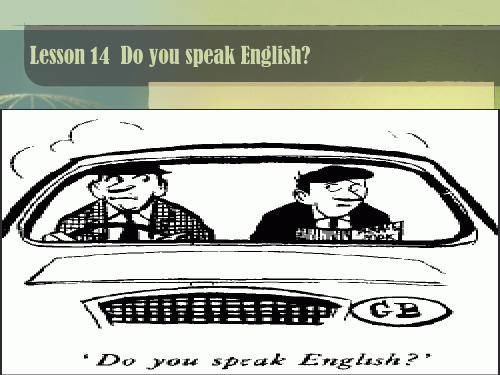
【课文讲解】
1.On the way, a young man waved to me. • on one’s way to … 在某人去某地的路上
on one’s way home 某人回家的路上
P30 on the way/ in the way /by the way/ in this way
② vt. 挥动,摇动 wave a hand at sb向某人招手 他们挥着国旗,欢迎我们。 They waved the national flag and welcomed us.
6
New Words and Expressions
wave
① v. 招手
wave to sb. 向某人招手 wave goodbye to sb.向某人挥手再见 他看见我们时,向我们挥了挥手. He waved to us when she saw us.
mother/native language the second language spoken language written language foreign language body language sign language
12
New Words a, 偏重于陆地旅行 2 hours' journey;3 days' journey(三天路 程) 去旅行 go on a journey travel / travelling n. 周游(长途旅行) trip n. 短距离旅行 (时间或距离上较短) tour n. 游玩,环游(为了玩) voyage n. 旅行(海上) flight n. 空中飞行
reply [ri'plai] v. 回答 language ['læ ŋɡwidʒ] n. 语言 journey ['dʒə:ni] n. 旅行
新概念二 第14课课件

★4. language 语言,措辞。
【常用词组】 native language 本国语 mother tongue(舌头)母语。 【例句】 My mother tongue is Chinese.我的母语是汉语。 Sign language is another way to express yourself. When you don't know how to saysomething in a foreign language, you canuse your body language.
★2. reply . v. 回答,回复
【常用词组】reply to sb./sth.回复某人/事 It's very odd that she didn't reply to our letter.
【例句】 我上周一就给你发信了,但直到现在也没有得到你的任何回复,发生什么了? I wrote to you last Monday but haven't got any reply from you till now, what happened?。 请尽快回复我,谢谢! ·Please reply to me ASAP, TKS!
★3.★experience
①.经历(可数) ②.经验(不可数) vt.经验,体验 * He has a lot of experiences. They want someone with a lot of experience for this job. Does she have any experience in teaching? Have you ever experienced anything like this? The village has experienced great changes since 1980 *experienced adj.有经验的,经验丰富的 He is an experienced doctor.
新概念二lesson 14PPT课件
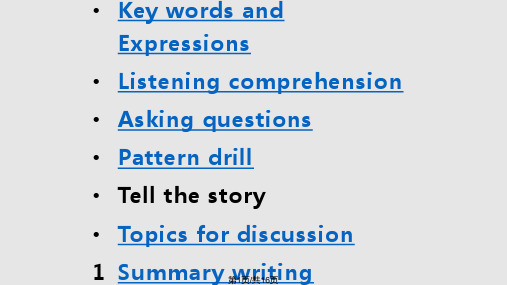
第12页/共16页
Topics for discussion
• 1 Have you ever asked for a lift, or given one? If so ,describe the person you met.
•
• 2 Describe the various ways you are able to recognize a foreigner in your country.
• I had nearly reached the town, when the young man suddenly said, very slowly,
第15页/共16页
感谢您的观看!
第16页/共16页
• 过去完成时
• 过去完成时:由had+过去分词构成,它表示过去某时或某动作发 生之前已经完成的动作或情况,即“较早的过去”。过去完成时 一定要以一个过去时态作铺垫, 这个动作一定要发生在had done 之后。
• 在用过去完成时态的句子中,常用连词when,after,as soon as,until,by that time等。常与现在完成时连用的副词如 already,just,never,never…before也常与过去完成时连用, 以强调事件发生的先后次序:
What did you have last year? What part of France were you in? Had you been in a small village? Where did you drive on to? Who waved to you on the way? What did he ask you for? When did you say good morning to him? What language did you speak? Did your passenger reply in French? How many words of French do you know? Did you speak to him during the journey? When did he suddenly say something? What did he ask you?
新概念2 第14课ppt课件

All things come to those who wait.
Lesson 14
Do you en to the tape
• listen to the tape write down what you heard as much as possible:
I had nearly reached the town, when the young man suddenly said, very slowly, "Do you speak English?' As I soon learnt, he was English himself!'
Motto
go on a trip = go on business
travel n. 周游(长途旅行) tour n. 游玩(为了玩) tourist n. 游客 voyage n. 旅行(海上) flight n. 空中飞行
【Text】
After I had left a small village in the south of France, I drove on to the next town. after引导的从句如果一个是过去时, 一个是过去完成时,那一定是从句用 过去完成时;before引导的从句表 示“在……之前”,主句发生在从句之 前, 主句用过去完成时。
reply v. 回答 reply与answer的区别: ① 作为不及物动词是一样的 :
He answered/replied. ② 作为及物动词就不一样了 :
answer sth. answer the letter 回信
reply to sth. I will reply to the letter.
新概念英语第二册第14课-Do you speak English-
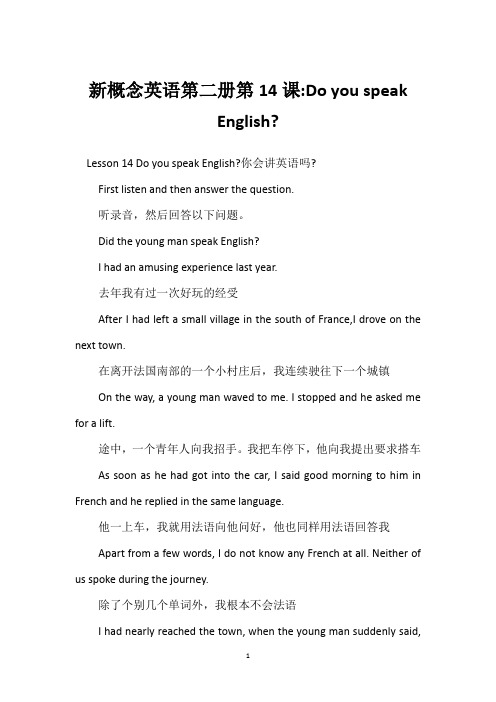
新概念英语第二册第14课:Do you speakEnglish?Lesson 14 Do you speak English?你会讲英语吗?First listen and then answer the question.听录音,然后回答以下问题。
Did the young man speak English?I had an amusing experience last year.去年我有过一次好玩的经受After I had left a small village in the south of France,I drove on the next town.在离开法国南部的一个小村庄后,我连续驶往下一个城镇On the way, a young man waved to me. I stopped and he asked me for a lift.途中,一个青年人向我招手。
我把车停下,他向我提出要求搭车As soon as he had got into the car, I said good morning to him in French and he replied in the same language.他一上车,我就用法语向他问好,他也同样用法语回答我Apart from a few words, I do not know any French at all. Neither of us spoke during the journey.除了个别几个单词外,我根本不会法语I had nearly reached the town, when the young man suddenly said,very slowly, Do you speak English?旅途中我们谁也没讲话。
就要到达那个镇时,那青年突然开了口,渐渐地说道“你会讲英语吗?”As I soon learnt, he was English himself!我很快了解到,他自己就是个英国人!New words and expressions 生词和短语amusingadj. 好笑的,好玩的experiencen. 经受wavev. 招手liftn. 搭便车replyv. 回答languagen. 语言journeyn. 旅行Notes on the text课文解释1 I drove on to the next town.我连续驶往下一个城镇。
新概念英语第2册课件Lesson14(共40页)

▪ Language 1)语言 ▪ speak a language,讲一门语言 ▪ a foreign language, the second language ▪ native language 母语 ▪ The native language is Chinese. ▪ mother tongue 母语(口语中用) ▪ My mother tongue is Chinese. ▪ 2)除了文字以外的传达,人造语言 ▪ body language,sign language
this job. (经验,不可数名词) ▪ Does she have any experience in teaching? ▪ ③ vt. 经验,体验 ▪ Have you ever experienced anything like this? ▪ The village has experienced great changes
Because of them thought the other was French and both of them knew little French.
Key Words and Expressions
amusing
a. 有趣的
experience
n. 经验,体验
wave
v. 挥手
ask sb. for a lift 要求搭车
▪ ★experience n. 经历(可数);经验(不可数) ▪ ① n. 经历(可数) ▪ He has a lot of experiences. (经历,可数名词) ▪ ② n. 经验,体验(不可数) ▪ They want someone with a lot of experience for
新概念英语第二册课件Lesson14(共35页)

Passage analysis
• After I had left a small village in the south of France, I drove on to the next town.
• drove on 继续开车 • on 加在动词的后面表示继续 • Eg: My heart will go on. 《我心永恒》
• In the way 挡路
• He tried to get to the door, but the table was in the way.
• 他试图走近大门,可是桌子挡住了去路。 • By the way 顺便说
• By the way, how is your mother? • 顺便问一下,你妈妈怎么样?
Lesson 14
Review
• 将来进行时态 • 结构: • will be doing • 意义: • 将来进行的事情
Review
• 我们将在花园里干活。 • We shall /will be working in the garden. • 他们今晚就走。 • They will be leaving this evening.
• 1. as soon as 一… 就 • 我一到北京就给你打电话。
• As soon as I arrive in Beijing, I will call you.
• 我一到家就给你打电话。
• As soon as I get home, I will call you.
• 我一遇见他就非常喜欢他。
Warm-up questions
• 1. What do you think is happening in the picture?
(完整版)新概念英语第二册第14课
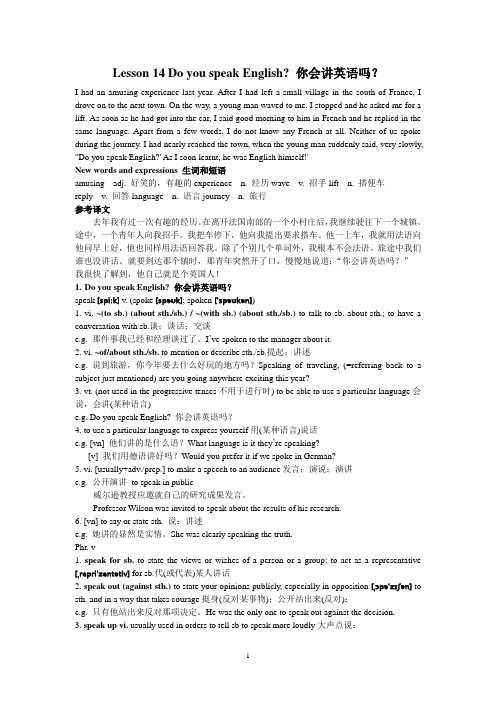
Lesson 14 Do you speak English? 你会讲英语吗?I had an amusing experience last year. After I had left a small village in the south of France, I drove on to the next town. On the way, a young man waved to me. I stopped and he asked me for a lift. As soon as he had got into the car, I said good morning to him in French and he replied in the same language. Apart from a few words, I do not know any French at all. Neither of us spoke during the journey. I had nearly reached the town, when the young man suddenly said, very slowly, "Do you speak English?' As I soon learnt, he was English himself!'New words and expressions 生词和短语amusing adj. 好笑的,有趣的experience n. 经历wave v. 招手lift n. 搭便车reply v. 回答language n. 语言journey n. 旅行参考译文去年我有过一次有趣的经历。
在离开法国南部的一个小村庄后,我继续驶往下一个城镇。
途中,一个青年人向我招手。
我把车停下,他向我提出要求搭车。
他一上车,我就用法语向他问早上好,他也同样用法语回答我。
(完整版)新概念第二册第14课课文讲解
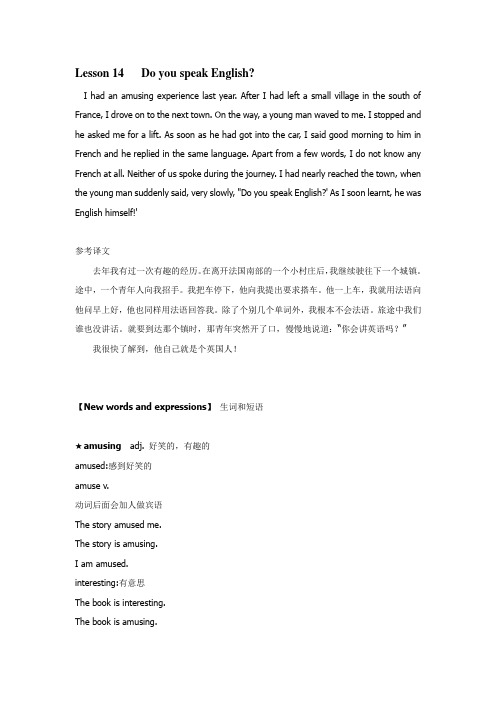
Lesson 14 Do you speak English?I had an amusing experience last year. After I had left a small village in the south of France, I drove on to the next town. On the way, a young man waved to me. I stopped and he asked me for a lift. As soon as he had got into the car, I said good morning to him in French and he replied in the same language. Apart from a few words, I do not know any French at all. Neither of us spoke during the journey. I had nearly reached the town, when the young man suddenly said, very slowly, "Do you speak English?' As I soon learnt, he was English himself!'参考译文去年我有过一次有趣的经历。
在离开法国南部的一个小村庄后,我继续驶往下一个城镇。
途中,一个青年人向我招手。
我把车停下,他向我提出要求搭车。
他一上车,我就用法语向他问早上好,他也同样用法语回答我。
除了个别几个单词外,我根本不会法语。
旅途中我们谁也没讲话。
就要到达那个镇时,那青年突然开了口,慢慢地说道:“你会讲英语吗?”我很快了解到,他自己就是个英国人!【New words and expressions】生词和短语★amusing adj. 好笑的,有趣的amused:感到好笑的amuse v.动词后面会加人做宾语The story amused me.The story is amusing.I am amused.interesting:有意思The book is interesting.The book is amusing.funny:好笑的,可以指贬义,开心的,令人开心的interesting/funny story★experience n. 经历经验、体验:不可数名词经历、感受:可数名词He has a lot of experience. He has a lot of experiences.Experience is the best teacher. 经验是最好的老师。
新概念英语2第14课 NCE2_Lesson14
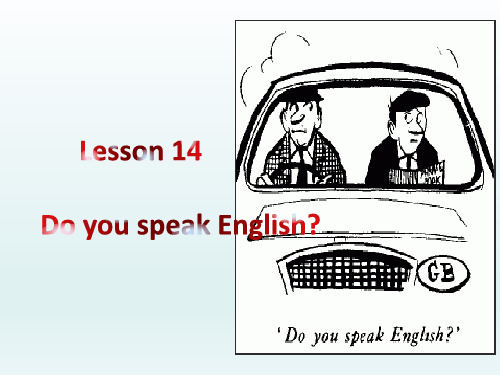
window. • 句式: • ①肯定句:主语+had+过去分词+其他 • They had broken the window. • ②否定句:主语+had+not+过去分词+其他 • They hadn't broken the window.
Did you talk to them?
amusing experience wave lift apart from reply language journey reach
a. 有趣的 n. 经验,体验 v. 挥手 n.搭便车 除…以外 n. 回答 n. 语言 n. 旅行 v. 到达
★amusing adj. 好笑的,有趣的
★Journey n. 旅行
• Journey : 长途旅行 • trip:短距离旅行或出差 Journey to the West
Listen to the story and answer questions
• 1.Whom did the writer give a lift to in the south of France last year.
job. (经验,不可数名词) • Does she have any experience in teaching? • ③ vt. 经验,体验 • Have you ever experienced anything like this?
• The vies since 1980.
• 正如我告诉过你的,我对流行音乐感兴趣。
新概念英语第二册lesson14(共27张PPT)

• reply vi 回答,答复 • eg. She has replied to my letter. Replay to a question 回答一个问题 • answer • 1)vt. (用语言的,行为的)回答,答复 • Eg. Did you answer her letter ? • Eg, I answered his insult with a blow. • 2)vt. 应接,应答 • Answer the door • Answer the telephone • 3)answer back/talk back 顶嘴 • 4)answer for 代表,对某事负责 • Eg. It will answer for our purpose • Respond vi • 1) 回答,应答 • Eg. She didn’t respond to my question • Eg. She didn’t respond to my letter • 2)对……作出回答或反应 • Eg. He respond to the insult with a punch
• Trip n (美)包括乘短途交通工具以及徒步远足的所有旅行
•
(英)通常指短途的观光旅行
• A bus trip
• A business trip
• Take a trip
• Voyage 航海,航行,乘船旅行
• Eg. Go on a voyage around the world
• 做环游世界的旅行
• Eg. As soon as the sun had set we returned to our hotel.
• Eg. The children ran away after they had broken the window.
新概念2第14课
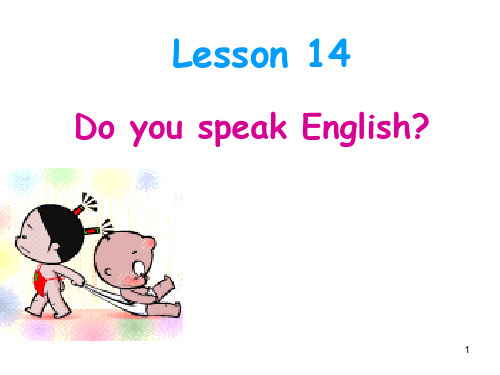
三、当表达一个人没有做某事,另一个人也没 做同一类事时,可用neither或nor进行简略回 答
Neither / Nor+助动词 / 情态动词 / be动词+
主语。
He doesn't go to school by bike. Neither / Nor do I.
They didn't go to the park yesterday.
After I had left a small village in the south of France, I drove on to the next town.
in the south of 在……南部 in the north of in the west of east/southeast/northeast..
Neither bees nor birds would have the bat as their friend.
neither
一、neither作主语,表示"两者中没有一个"。
Neither of them likes football.
二、neither...nor...表示"既不……也不……" She likes neither butter nor cheese. (连
I amuse myself by reading on weekends. 周末我读书消遣。
He tried to amuse her by singing a song. 他试图通过唱歌逗乐她。
amusement n. 消遣,娱乐,乐趣 我发现了集邮的乐趣。
I found amusement in collecting stamps. 令我们感到有趣的是,那个演员在舞台跳上跳下。
新概念二册第14课

Lesson 14 Do you speak English?你会讲英语吗?单词学习amusing adj. 好笑的,有趣的英文解释:enjoyable, causing laughter or smilesamuse [ə'mju:z] v.令人好笑的英文解释: make sb laugh or smileEveryone was amused at the cute boy. 大家都被这个可爱的孩子逗乐了。
or: Everyone was amused by the cute boy.The amusing story amused the children. 这个好笑的故事把孩子们都逗乐了。
be amused at/by 因…感到好笑be amused to do sth 做…取乐amusement [ə'mjuːzm(ə)nt] n. 娱乐,消遣 [U]She looked at me in amusement. 她饶有趣味地看着我。
experience [iks'piəriəns] 1) n. 经历,阅历 [C]an amusing experience 一次好笑的经历an unpleasant experience 一次不愉快的经历an unusual experience 一次不同寻常的经历He had many amusing experiences while traveling in France.当他在法国旅行时,有过许多有趣的经历。
You must try some of her home-made wine. It's quite an experience. 你一定要尝尝她家自酿的酒,那真是一饱口福啊。
2) n. 经验 [U]He hasn't had enough work experience. 他没有足够的工作经验。
I know from experience that he will arrive late.我从经验得出,他一定会迟到的。
- 1、下载文档前请自行甄别文档内容的完整性,平台不提供额外的编辑、内容补充、找答案等附加服务。
- 2、"仅部分预览"的文档,不可在线预览部分如存在完整性等问题,可反馈申请退款(可完整预览的文档不适用该条件!)。
- 3、如文档侵犯您的权益,请联系客服反馈,我们会尽快为您处理(人工客服工作时间:9:00-18:30)。
【Special Difficulties】
Ask与Ask For: ask v. 问,询问;请求,要求,邀请 ask a question/ask sb. 问(一个 问题)/问某人 I asked (Mary) a question. ask for 要,要求(某样东西) I asked for a cup of coffee, but they gave me a cup of tea.
③ both只指两个人或物。当它用在名 词前时,of 可有可无;当用在代词前 面时,其后必须加of Both books/Both of the books are interesting. Both of us/them left early. ④none of 三者或三者以上之间都不
See you !
That man is the richest whose pleasure are the cheapest. -Henry David Thoreau
2. Notes
2014-8-23
郑州恩特英语 nce2
12
amusing adj. 好笑的, 有趣的 The story is amusing. (好笑的) amused adj. 感到好笑的(要笑出 声) amuse v. 使发笑,使愉快 The story amused me. funny adj. 好笑的(不一定要笑出 声可以指贬义),开心的,令人开心的 interesting / funny story
except for含有对整体中的某一 个方面不满意,except for 可以 不放在句首, 强调整体当中某一 方面除外, 剩下的整体都不错. The article is very good except for his handwriting. Except for his height, he is very excellent.
As soon as he had got into the car, I said good morning to him in French and he replied in the same language.
Apart from a few words, I do not know any French at all. Neither of us spoke during the journey.
reply v. 回答 reply与answer的区别: ① 作为不及物动词是一样的 : He answered/replied. ② 作为及物动词就不一样了 : answer sth. answer the letter 回信 reply to sth. I will reply to the letter.
On the way, a young man waved to me. on the way 在路上, 在途 中 wave to sb. 冲某人挥手
As soon as he had got into the car, I said good morning to him in French and he replied in the same language. as soon as 一……就……,后一定要 加一个句子(时间状语从句), 强调两个 动作几乎是连在一起的,“一” 后面的 先发生。此状语从句, 一旦遇到将来时, 变为一般现在时 As soon as you arrive, you must call me.
如果除了整体之外,还有这个人也做 了(包括),是加号=besides;如果 除了整体之外,这个人没有做(排除), 是减号=except;若放句首,统一 用apart from代替 except/besides I invited everyone except George. /Except for George I invited everyone. (减号)
Except, Except for与Apart from 都表示“除……以外”,有时可互换, 但except不用于句首,except for 和apart from则可以。 Everyone has helped in some way apart from/except for/except you. apart from习惯上喜欢放句首, apart from=except/besides
language n. 语言 native language 母语 mother tongue 母语(口 语中用) My mother tongue is Chinese.
journey n. 旅行 所有的旅行, 偏重于陆地旅行 go on a journey 3 days' journey(三天路程) trip n. 短距离旅行或出差 (时间或距离上较短) go on a trip = go on business
drive on 继续开往(on加在动 词的后面表示继续) My heart will go on 副词on紧跟在动词后面时可以表示 “向前”、“继续下去”等意义: He talked on until everybody had gone.
表达方位的表达方式一共有3个介词: in(在……里面), on(接壤), to(没有相接的, 是相离的) A is to the east of B (A B不相 接) A is on the east of B (A B接壤) A is in the east of B (A在B里面)
experience ① n. 经历(可数) He has a lot of experiences. ② n. 经验,体验(不可数) Does she have any experience in teaching? ③ vt. 经验,体验 The village has experienced great changes since 1980. experienced adj. 有经验的
2014-8-23
郑州恩特英语 nce2
3
1. Sentence Structures
2014-8-23
郑州恩特英语 nce2
4
As soon as he had got into the car, I said good morning to him in French and he replied in the same language.
2014-8-23
郑州恩特英语 nce2
5
I had an amusing experience last year. After I had left a small village in the south of France, I drove on to the next town.
On the way, a young man waved to me. I stopped and he asked me for a lift.
【Key structures】
过去完成时:由had+过去分词构 成,过去完成时一定要以一个过去 时态作铺垫, 这个动作一定要发生在 had done之后。 在用过去完成时态的句子中,常用 连词when,after,as soon as, until,by that time等。
常与现在完成时连用的副词如 already,just,never, never…before也常与过去完成时 连用,以强调事件发生的先后次序: I didn’t know that she was a famous actress until you had told me. 没有明确的时间状语时,通过上下 文可以看出动作发生的先后。
Apart from a few words, I do not know any French at all. apart from… 除……以外 not … at all一点都不,表强 调
I had nearly reached the town, when the young man suddenly said, very slowly, "Do you speak English?' nearly 将要 when的翻译要看具体情况, 在这 里译为“就在此时.
I had nearly reached the town, when the young man suddenly said, very slowly, "Do you speak English?' As I soon learnt, he was English himself!'
Motto
Motto
All things come to those who wait.
Lesson 14
Do you speak English?
郑州恩特英语 Defoe
Listen to the tape
• listen to the tape write down what you heard as much as possible:
travel n. 周游(长途旅行) tour n. 游玩(为了玩) tourist n. 游客 voyage n. 旅行(海上) flight n. 空中飞行
【Text】
After I had left a small village in the south of France, I drove on to the next town. after引导的从句如果一个是过去时, 一个是过去完成时,那一定是从句用 过去完成时;before引导的从句表 示“在……之前”,主句发生在从句之 前, 主句用过去完成时。
Do you speak English? 你说 英语吗? 你是说英语国家的人吗?( 问的是一个事实,不是问会说英语 吗) Do you swim? 你去游泳吗? Can you swim? 你会游泳吗?
